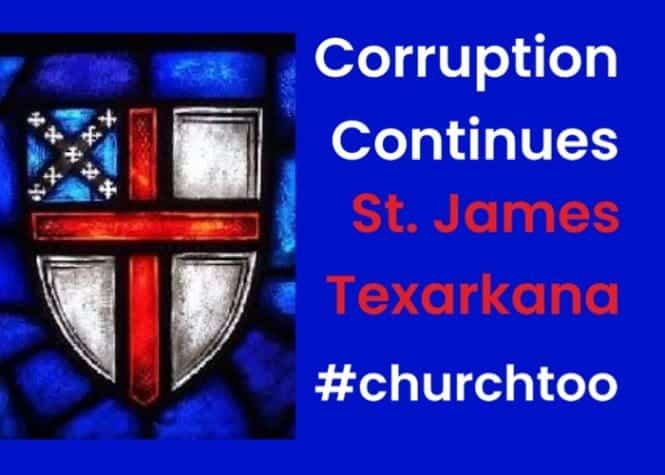Sources close to the matter report that things are getting dire at St. James Episcopal Church in Texarkana following allegations that the rector, David Halt, retaliated against parochial vicar Rich Daly for opposing the sexual harassment of an adult woman connected with the parish.
Anglican Watch has learned that finances are becoming tenuous at the parish, with plummeting attendance and giving. Moreover, sources tell us that while some parishioners are trying to plug the financial leaks, Halt may be misrepresenting the church’s financial condition to members and others.
Assertions by parishioners that Halt does little to earn his six-figure salary, often make claims of questionable veracity, and is socially flat-footed don’t help the situation.
Indeed, Halt reportedly has told others that he expects to be paid to go away — hardly an appropriate attitude for any member of the clergy. Moreover, we find the complaints against Halt plausible, as we’ve heard them from multiple sources and over an extended time.
Even worse, Bishop George Sumner and the Diocese of Dallas have refused to act with integrity in this matter, sandbagging a Title IV clergy disciplinary complaint against Halt for retaliation.
The Title IV case involves allegations that Halt, acting in collusion with Sumner, forced parochial vicar and former police officer Rich Daly out of office after Daly forwarded the complaints of sexual harassment to the Diocese.
Anglican Watch has investigated the allegations against Halt and believes them to be credible.
Meanwhile, the alleged perpetrator of the sexual harassment, Douglas Anderson, recently reached a Title IV clergy disciplinary accord with the Diocese of Massachusetts in the matter.
Despite the seriousness of the claimed misconduct, which includes sexual harassment and lying in a previous Title IV case, the Anderson accord was farcical, allowing him to remain (but not serve) as Advent’s rector until his retirement fully vests and imposing no other penalties.
Indeed, treating his two years of paid administrative leave — otherwise known as paid vacation — as a penalty is insulting to all victims of sexual harassment and undercuts the notion that Title IV in any way promotes healing, justice, or reconciliation. And while there may be pastoral directives out there of which we are not aware, the fact that Gates is retiring and any directive not public makes the possibility of enforcement remote.
Instead, the so-called penalties in the Anderson case make clear that Title IV is often a barely disguised reward for bad behavior by clergy.
Similarly, the fact that Bishop Alan Gates would sign off on this travesty of an accord suggests a deeply dysfunctional diocese and a skewed theology of forgiveness.
In short, the entire situation reflects poorly on The Episcopal Church, the Dioceses of Dallas and Massachusetts, bishops Alan Gates and George Sumner, and St. James, Texarkana.
Meanwhile, we know of no current or prospective church members who think sexual harassment or retaliation for opposing sexual harassment is okay.
Relatedly, Halt’s efforts to smear Daly in an effort to protect his own reputation are backfiring badly and are discrediting the church at every level, even as they erode Halt’s future ability to serve as clergy.
Of course, all of these means that St. James, the only Episcopal presence in many miles, is racing ever faster towards collapse.
Anglican Watch urges the Episcopal Diocese of Dallas, Bishop George Sumner, and the St. James vestry to take the situation seriously and act now.
It is not unfair to say that, absent an immediate and dramatic turnaround, the Episcopal Church in that area is in danger of collapse.
As for Title IV, this is another appalling example of just how cumbersome, ineffective, and unjust the current clergy disciplinary process is.
Indeed, in what for-profit organization would the penalty for sexual harassment and lying under oath in an internal investigation be a two-year paid vacation and the vesting of one’s retirement?
We say this as liberals: The Episcopal Church is morally broken at its core, and the national church and the dioceses must act with urgency to address the root causes if the church wants to survive.
Again, the time to act is now.


Leave a Reply